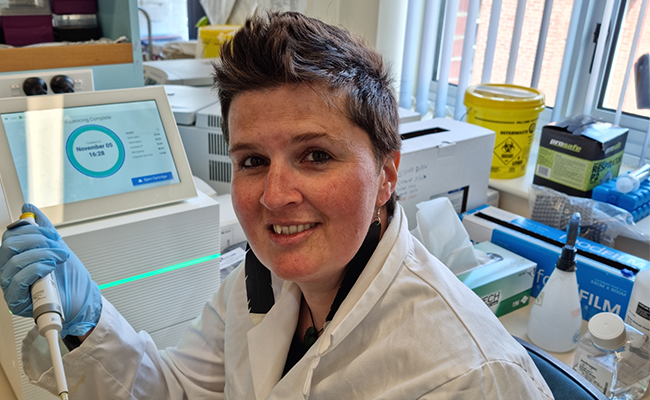 Dr Alana Alexander is co-developing 'science pūrākau'; a way of translating scientific work into memorable narratives that will empower and uplift those who hold kaitiakitanga over taonga species
Dr Alana Alexander is co-developing 'science pūrākau'; a way of translating scientific work into memorable narratives that will empower and uplift those who hold kaitiakitanga over taonga species
Rutherford Discovery Fellowship recipient Dr Alana Alexander will be investigating fisheries', disease and climate change's effects on dolphins and whales, then translating her science into memorable narratives for Māori.
The Department of Anatomy's Dr Alexander, Te Hikutu, Ngāpuhi, is researching how complex interactions between genomes, co-existing microscopic organisms, and the environment affect these taonga (prized) species' appearance, behaviour and health throughout their whakapapa.
To help conserve dolphins and whales, she wants to clarify the past impacts of fisheries on the endangered Hector's and Māui dolphins, discovering why only some dolphins are susceptible to toxoplasmosis ̶ a deadly, infectious disease ̶ and to predict the impact of future climate change on both whales and dolphins.
“Samples from species with different temperature preferences will reveal the impacts of past climate change and this information will be incorporated into an advanced model to forecast how these species will be impacted by continuing global warming,” Dr Alexander says.
While genomics has immense potential in the conservation of culturally important marine species such as whales and dolphins, Dr Alexander recognises communication and co-leadership of projects with Māori have been limited.
“A major barrier is translating the highly technical language and approaches of genomics to local kaitiaki [guardians],” Dr Alexander says.
“Te ao Māori possesses many tools for conveying complex relationships, including pūrākau, or tribal narratives, and so by working alongside local communities, I'm dedicated to co-developing 'science pūrākau'; a way of translating scientific work into memorable narratives that will empower and uplift those who hold kaitiakitanga over taonga species.”
Dr Alexander's duality as Māori and scientist is pivotal to pūrākau science, allowing her to establish a framework that will contribute to understanding the threats facing our taonga species and ensure the benefits of genomics research is shared equitably.
The Rutherford Discovery Fellowships seek to attract, retain and develop New Zealand's most talented early-to mid-career researchers and are awarded by the not-for-profit Royal Society Te Apārangi.
